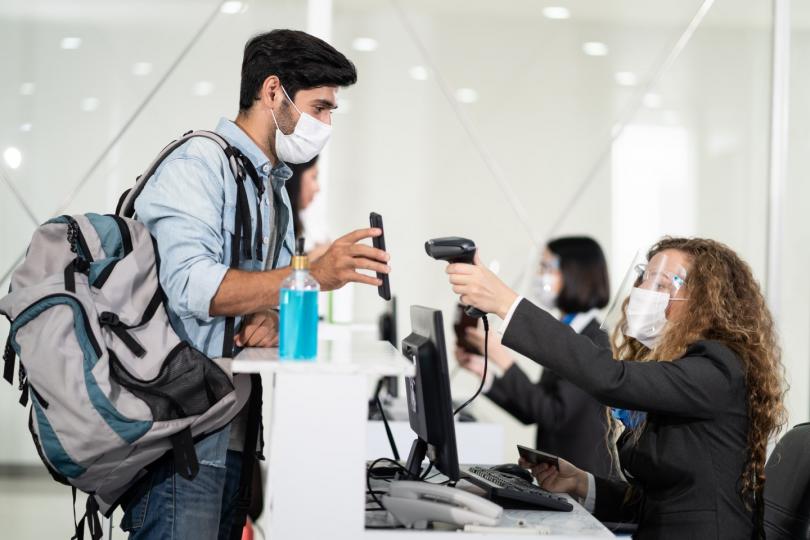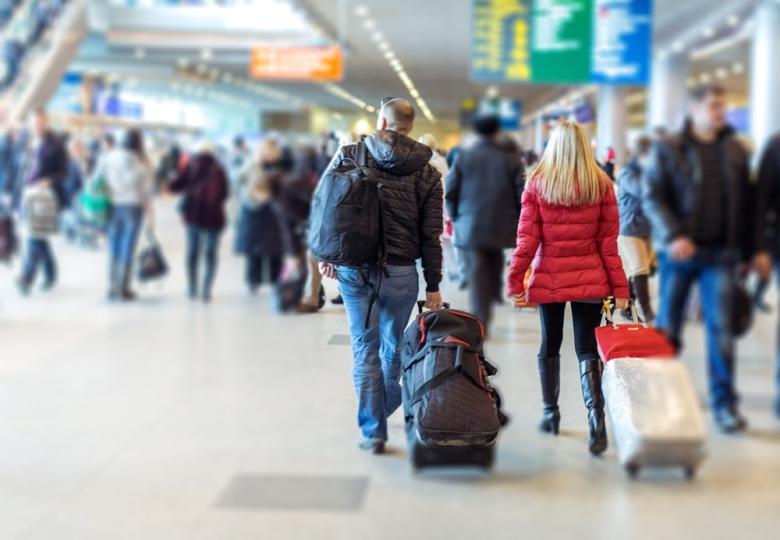Even though some travel restrictions to Germany have been eased, the Federal Republic has imposed certain (quarantine) regulations on visitors from an EU or Schengen country or other non-EU countries entering Germany. Please also note the EU-wide travel restrictions when entering Germany from non-EU countries.

COVID-19: Is a negative test result sufficient when traveling from a high-risk area?
Germany's borders are generally open and travel to Germany is possible.
However, before you enter Germany, you should take out travel insurance. This is because, due to the ever-changing COVID-19 situation, your travel plans may be disrupted even if you are fully vaccinated. International advice to control the spread of COVID-19 should be complied with at all times. This includes washing hands regularly, keeping a minimum distance and wearing a mask according to the current local regulation. It is best to obtain the latest information about your final destination shortly before departure. The reason for this is that in the various German states the relevant authorities often issue different regulations.
What is the current situation regarding COVID in Germany?
Germany has taken strict local regulations measures to contain the spread of the virus. At the moment, this is mainly to prevent the spread of the new COVID-19 virus variant Omicron. However, although strict entry restrictions are in place, Germany's borders are open to travel from third countries and the EU/Schengen area countries.
What should visitors expect?
Germany has started to permit entry from several countries again as of July 2020. At the moment, travelers over the age of twelve must present the following proof when entering Germany:
Entry from an area with a variant of concern or a high-risk area:
- Proof of complete COVID-19 vaccination or
- Proof of recovery from infection
➕ in addition:
- Negative COVID-19 test result
Entry from any other country or territory:
- Negative COVID-19 test result or
- Proof of a complete COVID-19 vaccination or
- Proof of recovery from infection
Note on evidence of recovery: A positive PCR test result dating back at least 28 days but no more than six months. The proof of illness must be written in German, English, French, Italian or Spanish and must be available in digital or paper form.
There is an urgent need for submitting proof to the German authorities even before you enter Germany. Usually, this proof is presented in digital or paper form before boarding the plane to Germany.
New 2G/2G+ restrictions
ℹ️ In Germany, the new “2G” regulation is currently in effect in many federal states.
This means that access to accommodations, restaurants and events is only possible for people who are fully vaccinated or have recovered from COVID-19. Additionally, a negative COVID test (“2G+”) may need to be presented. Moreover, only digital vaccination certificates recognized in Germany will be accepted. Therefore, you may not be able to access certain events or facilities if you only have an Indian or a non-EU vaccination certificate. For this reason, you should inquire in advance whether you will be able to travel under the new restrictions.
What exactly are the new 2G/2G+ restrictions?
- 2G: The 2G rule stands for fully vaccinated (geimpft) or recovered (genesen). This means that only people who are completely vaccinated or convalescent can visit certain places or events. A negative Corona test is not sufficient here.
The 2G-Plus rule represents a further tightening of the regulations:
- 2G+: Only completely vaccinated or recovered individuals who also have a negative result on a rapid antigen test (no more than 24 hours old) or PCR test (no more than 48 hours old) may participate in events where the 2G-Plus rule applies. No test is required for persons with booster vaccination.
Who is subject to 2G/2G+ entry restrictions?
Find out if you fall under the brand-new restrictions:
ℹ️ Anyone who does not meet one of the following criteria is currently not allowed to enter Germany.
- German citizens or their immediate family members
- EU citizens and citizens of Liechtenstein, Switzerland, Norway and Iceland as well as their immediate family members
- Citizens of non-EU countries who hold a valid long-term residence permit from an EU or Schengen country, as well as their immediate family members, provided they comply with the passport and visa regulations
- Fully vaccinated persons, provided that they comply with the passport and visa regulations
- Persons with important travel reasons, such as certain business travelers, trade show visitors and exhibitors, or participants in conventions
- Unmarried partners permitted under certain conditions
- Residents of a country who are permitted unrestricted entry into Germany
What are the current requirements to enter Germany?
We will now explain the current entry regulations and entry restrictions in more detail:
In principle, entry to Germany is possible from:
- EU member states
- Countries associated with Schengen (Iceland, Norway, Switzerland, Liechtenstein)
- Other countries from which entry is possible according to the current epidemiological situation assessment of the EU
Entry from all other countries for any purpose (e.g. for business travelers, trade fair visitors or tourism) is only possible for fully vaccinated persons.
The traveler must have received the last vaccine dose required for full vaccination protection at least 14 days prior to the travel date, and the vaccine the person received must be one of those listed on the Paul Ehrlich Institute website.
Travel bans from countries affected by coronavirus variants:
- A travel ban applies to countries with the widespread occurrence of COVID-19 variants of concern. Airlines and other transport companies are not allowed to transport people from these countries to Germany.
Who is not subject to the entry restrictions?
There are only a few exceptions to this travel ban:
- German nationals and persons residing in Germany with a current right of residence, as well as their spouses, partners living in the same household, and family members like minor children
- Persons who take a connecting flight and do not leave the international transit area of a commercial airport
However, persons to whom these exceptions apply must complete a digital entry registration and submit a test before entering the country. They must also comply with applicable quarantine requirements.
How does the digital entry registration work?
Travelers who have visited a high-risk area or an area with a variant of concern in the last ten days before entering Germany must register digitally and carry proof of registration with them when entering the country. The digital entry registration is free of charge.
Exceptions to this registration requirement apply to persons who have only passed through a high-risk area or an area of variant concern without making a stopover or who are only in transit through Germany. In addition, persons who enter Germany after a stay in a high-risk area are exempt from this obligation for stays of less than 72 hours to visit close relatives or family members.

Who is allowed unrestricted entry?
In general, people (German citizens, EU citizens or citizens of third countries) who are fully vaccinated and can present proof of vaccination (a vaccination certificate accepted by the German authorities or a WHO vaccination booklet) can travel to Germany and enter Germany without having to comply with certain quarantine regulations or undergo mandatory testing.
Is proof of vaccination sufficient?
Mandatory testing is not necessary in case the proof of vaccination contains:
- Personal data of the vaccinated person (contact details like surname, first name and date of birth or number of passport/identity card)
- Date and number of vaccinations
- Name of the particular vaccine administered
- Name of the disease against which the person was immunized
- Features that allow identification of the person or entity that was responsible for the vaccination or issuance of the certificate
When should quarantine measures be taken?
In Germany, quarantine is mandatory for all persons who have stayed in high-risk areas or in a virus variant area within the last ten days. People who enter Germany from high-risk areas must go to their accommodation immediately after arrival and remain isolated for 10 days. During the quarantine period, travelers are not allowed to leave the accommodation or receive guests.
ℹ️ Note the difference: After a stay in a high-risk area, travelers must isolate themselves for 10 days; after a stay in an area with a variant of concern, they must isolate themselves for 14 days.
The quarantine period may end sooner if a negative COVID-19 test result is presented (conducted with a nucleic acid amplification technology - like a negative PCR test), measured on or after the 5th day of self-isolation. The quarantine period generally lasts until evidence of full vaccine protection, cure of infection, or a negative PCR test result.
Tip: Always follow local regulations. These may include quarantine measures in the event of confirmed infection due to a positive PCR test result, for example.
Who has to show a negative test result?
Travelers who travel to Germany from a high-risk area or virus variant area have to hold proof of a negative COVID test upon entering Germany. That means, even if they have proof of vaccination against COVID-19, they have to show the negative test result obtained as well.

What should you do when you are in Germany?
All airports in Germany, including Berlin Brandenburg, Frankfurt, Munich, Düsseldorf and Hamburg airports, are open. Various attractions (e.g. museums and other historical sites), restaurants and hotels are also currently open to tourists in Germany. However, each state has its own COVID-19 regulations, so you should check the regulations in that state before traveling to Germany.
- Remember that masks must always be worn indoors and the required distance should be maintained. Often, a COVID-19 vaccination, a certificate of recovery, or a test result is also required to enter certain places.
- Mouth and nose must also be covered on public transportation, in stores, and in busy outdoor places when the minimum distance from others cannot always be maintained.
- Masks must meet the requirements of FFP2.
ℹ️ If travelers develop symptoms related to COVID-19 (cough, runny nose, sore throat or a fever), they should call a doctor or the 116 117 hotline. Often, the hotel or accommodation can also help in such cases.
Tip: It is best for travelers to keep the contact details of the embassy or consulate of their home country in Germany in case they need to contact them.






